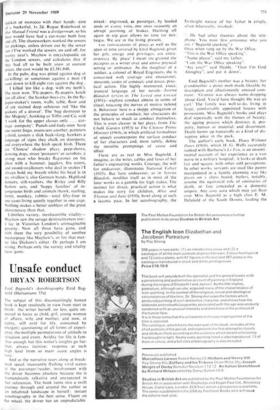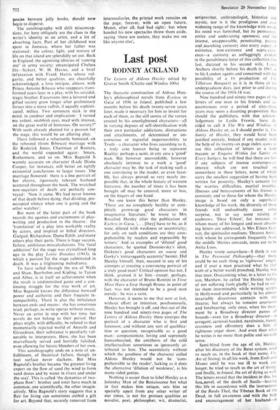Unsafe conduct
BRYAN ROBERTSON
Enid Bagnold's Autobiography Enid Bag- nold (Heinemann 55s) The subject of this disconcertingly honest book is kept resolutely in view from start to finish: the writer herself, no less, quite un- spared in focus as child, girl, young woman of affairs, wife and mother; and now, at eighty, still avid for life, consumed by energetic questioning of all forms of experi- ence, the multiple permutations of attitude to situation and event. Avidity for life is fam- iliar enough but this writer's insights go fur- ther, always incisive: response at such high level from so many acute angles is rare.
And as the narrative tears along at break- neck speed. incessantly flashing vivid scenes at the passenger/reader, involvement with the driver becomes absolute because she is tremendously talkative and unexpected in her references. The book turns into a swift journey through and around the author as an inhabited landscape in herself: instant autobiography in the best sense. Fluent on the wheel, the driver has an unpredictable streak: engrossed, as passenger, by loaded aside or emitic vista, one sinus suddenly an abrupt jamming of brakes. Hurtling off again in top gear allows no time for nos- talgia.. We are in the living present.
lac ramincations of place, as well as the span of ume covered by Enid Bagnoid, given her gift, energy and privileges, are extra- ordinary. By 'place' I mean me ground she occupies as a writer over and above pnysical setting or ambiance. As the daughter of a soldier, a colonel of Royal Engineers, she is concerned with courage and enueavour; stoicism; codes of conduct; and direct, prac- tical action. The highly mannered, exact, ironical language of her novels—Serena Blandish (1.124) of The Loved and tnvied (1950—explore conduct almost in terms of ritual, touching the nerves of motive behind it. Behaviour here is a sloppy abnegation of the principles of conduct; her characters do not behave so much as conduct themselves. This is even clearer in her plays, from The Chalk Garden (1953) to The Chinese Prime Minister (1964), in which artificial formalities of speech counterpoint the surface conduct of her characters and, most subtly, define the invisible promptings of cause and effect.
These are as real to Miss Bagnold, I imagine, as the wires, cables and fuses of her father's engineering works. Courage, the will for endeavour, illuminates National Velvet (1935). But here endeavour, as in Serena Blandish, modifies itself as in most of the later works as a gamble for high stakes. The instinct for direct, practical action is what makes the story for children, Alice and Thomas and Jane (1930), bowl along at such a laconic pace. In her autobiography, the
forthright nature of her father is crisply, often hilariously, invoked:
'...He had other theories about the tele- phone. You must first announce who you are. ("Bagnold speaking".) Once when rung up by the War Office.
—1 his is the War Office speaking".
"Name please", said my father.
"I am the War Otlice speaking".
"Are you?" said Daddy. "Then I'm God Almighty", and put it down'.
Enid Bagnold's mother was a beauty; her grandmother a pious snob made likeable by description and affectionately amused com- ment: 'Grannie was always name-dropping about God. You'd have thought He was an earl.' The family was well-to-do, living in large, comfortably appointed houses with possessions. Miss Bagnold's books and plays deal repeatedly with the themes of beauty; the ageing process which destroys it; pro- perty, human or material, and divestment. Death looms up repeatedly as a kind of dis- ruptive joker in the pack.
The author's early book. Diary Without Dates (1918). which H. G. Wells accurately ranked with Barbusse's Le Feu, is an unsenti- mental account of her experience as a van nurse in a military hospital: it looks at death fair and square, with other odd perceptions. In other works, servants are used like pawns manipulated in a faintly alarming way like pieces on a chess board; butlers, notably, assume the equivocal role of emissaries of death, or fate concealed as a domestic umpire. Any cosy aura which may yet float over Miss Bagnold as a high class E. M. Delafield of the South Downs, feeding the ponies between jolly books, should now begin to disperse.
The autobiography will shift misconcep- tions, for here obliquely are the clues to the writer's identity as an artist, and a lot of absorbing facts. Part of her childhood was spent in Jamaica, where her father was stationed: the colour, light, and texture of life on that island are splendidly set out. Back in England, the agonising idiocies of `coming out' in army society; emancipated Chelsea life—Sickert, W. H. Davies, and a- brief infatuation with Frank Harris whose vul- garity, and better qualities, are cheerfully acknowledged; a love intrigue, almost, with Prince Antoine Bibesco who reappears trans- formed years later in a play, with his suicidal, tragic brother. Excursions into a leisured and gifted society grow longer after preliminary forays into a more raffish, if equally sophisti- cated, milieu. Two sentences stick in my mind, in candour and implication: 'I turned my ardent, snobbish eyes, mad with interest, on the great world of hostesses. On society!' With seeds already planted for a passion for the stage, this would be an alluring play. - There followed a reluctantly bemused, on the rebound (from Bibesco) marriage with Sir Roderick Jones, Chairman of Reuters, and the world expanded again: Smuts, Rothermere, and so on. Miss Bagnold warmly accurate on character (Lady Diana Cooper, for instance), still better on tightly existential conclusions to larger issues. The marriage flowered: there is a fine portrait of her elusive, rigorously tolerant husband scattered throughout the book. The wretched non-sequiturs of death are perfectly con- veyed: 'Now it came. We had never known of that death before dying, that dividing, pre- occupied silence when one is going and the other watches'.
But most of the latter part of the book records the agonies and excitements of play- writing and production in the theatre: the `translation' of a play into workable reality by actors, and inspired or lethal directors. Gielgud, Richardson, Dame Edith. and many others play their parts. There is huge success, failure, ambitious miscalculations. The 'fatal addiction' for the stage was crystallised long ago in the play Louie Dundass (1943), in which a passion "for the stage culminated in death. It was a frightening melodrama.
To have sailed through the era of Wells and Shaw, Beerbohm and Kipling, to Tynan and Albee, is in itself an achievement when the result is undiminished gusto and a con- tinuing struggle for the true work of art. Miss Bagnold knows the difference betweei power and authority and their frequent in- compatibility. There is also the imbalance between ends and means: she has sometimes tried, perhaps, to write operas without music. Never an artist in step with her time, her novels do not belong to their period. Her plays might, with difficulty, be related to that momentarily rejected world of Anouilh and Giraudoux; their substance is peculiarly vul- nerable to interpreters. Here, she has been marvellously served and horridly falsified, even allowing for heroic blunders of her own.
This autobiography ends on a note of un- fulfilment, of theatrical failure, though its taut surface never slackens. But Miss Bagnold's brother became 'the greatest living expert on the flow of sand (by wind to form sand dunes and by water in rivers and under the sea)'. This is called 'the dynamics of two- phase flow': brother and sister have much in common, one scientifically, the other imagin- atively. Miss Bagnold's story suggests that a flair for living can sometimes outbid a gift for art. Beyond that, securely removed from intermediaries, the printed work remains on the page, forever, with an open future. Monet, after all, had bad sight: but when handed his new spectacles threw them aside, saying 'these are useless, they make me see like anyone else',











































 Previous page
Previous page